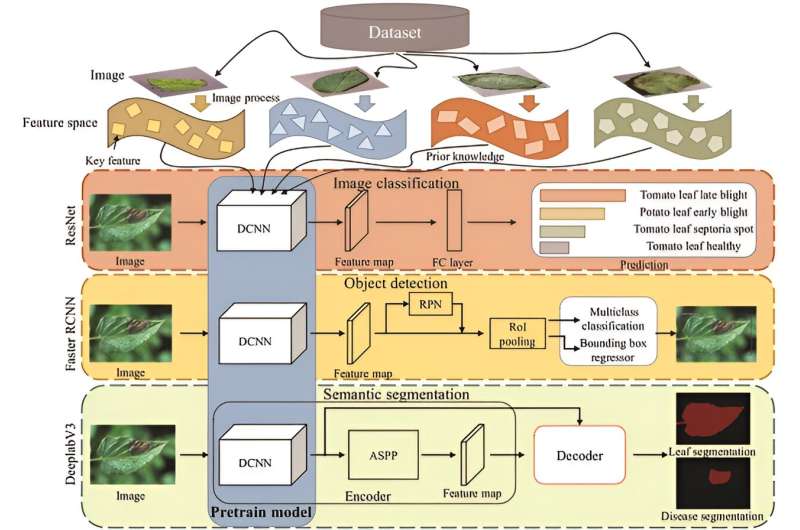This article has been reviewed according to Science X's editorial process and policies. Editors have highlighted the following attributes while ensuring the content's credibility:
fact-checked
trusted source
proofread
Revolutionizing plant disease diagnosis: Pre-trained models outperform traditional methods

Diagnosing plant disease is essential to meet the world's growing food demand, which is expected to increase with a population of 9.1 billion by 2050. Diseases can reduce crop yields by 20–40%, so early detection is critical. Traditional disease identification methods include expert analysis and machine learning-based image processing. However, the manual approach is inefficient and error-prone, while machine learning, particularly deep learning methods like Convolutional Neural Networks (CNNs), has revolutionized disease detection by extracting detailed image features.
These models are often pre-trained on non-botanical datasets like ImageNet and lack specific plant diseases domain knowledge, resulting in limited accuracy. This gap highlights the need to develop pre-trained models with specialized knowledge of plant phenotypes and diseases to improve the accuracy of plant disease diagnosis.
In May 2023, Plant Phenomics published a research article titled "PDDD-PreTrain: A Series of Commonly Used Pre-Trained Models Support Image-Based Plant Disease Diagnosis."
In this study, the authors developed a series of pre-trained models for plant disease diagnosis using a comprehensive dataset called PDDD (plant disease diagnosis dataset), which contains over 400,000 images of 40 plant species across 120 disease classes. Different model structures and parameters were explored to suit different diagnostic scenarios and devices. For evaluation, the researchers used methods like classification recognition accuracy and mean average precision (mAP), using datasets like Kaggle plant disease dataset and PlantDoc for testing.
The results showed that the pre-trained models based on the PDDD and PlantVillage datasets significantly outperformed those trained on ImageNet alone. This was evident in tasks like plant disease classification, where the hybrid model combining the PlantVillage and ImageNet datasets excelled. In plant disease detection, the Faster R-CNN model initialized with weights from PDDD and ImageNet showed improved detection accuracy and generalization capacity.
Similarly, in plant disease segmentation, DeeplabV3 models pre-trained on PDDD and ImageNet achieved higher accuracy, highlighting the advantage of incorporating domain-specific knowledge into the models.
In summary, these results highlight the importance of using large-scale, domain-specific datasets for pre-training in plant disease diagnosis. By making these models open-source, the authors aim to aid further research in this field and provide a basis for advanced and efficient plant disease diagnostic methods. The success of these models marks a significant step in the use of deep learning for plant disease diagnosis, suggesting potential applications in precision agriculture and other related fields.
More information: Xinyu Dong et al, PDDD-PreTrain: A Series of Commonly Used Pre-Trained Models Support Image-Based Plant Disease Diagnosis, Plant Phenomics (2023). DOI: 10.34133/plantphenomics.0054
Provided by NanJing Agricultural University




















